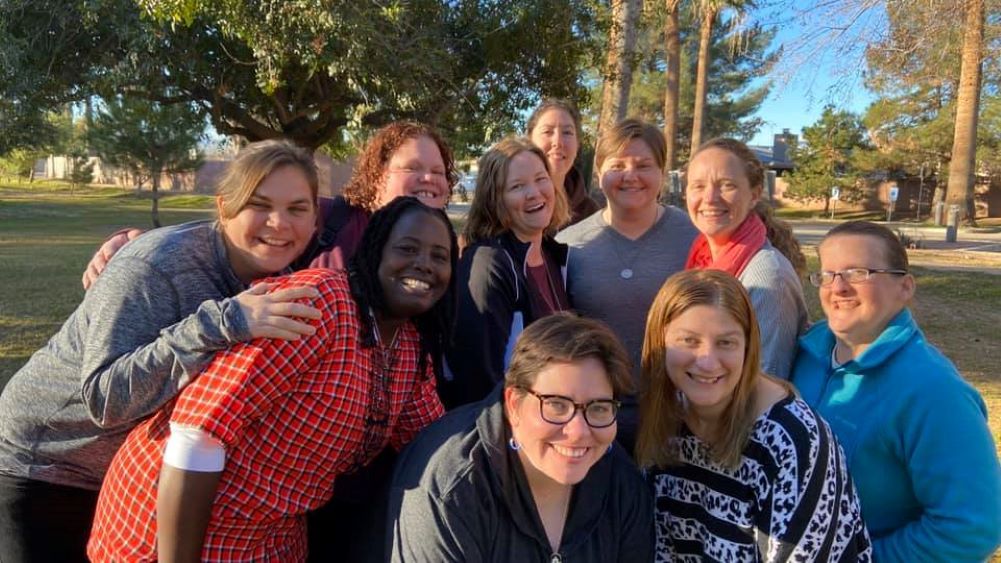
A discussion during a 2020 retreat for sisters in their 20s and 30s led to a series called "Come to the Table: Conversations on the Vows." (Courtesy of Tracey Horan)
Editor's note: This is Tracey Horan's last column for Horizons; she is taking time off to prepare for her final vows. Let us support her with our prayers.
Remember when you were young? Older folks would say things like, "You are the future!" Well, imagine being 33 years old and hearing this refrain echo from others with whom you share a life and mission. This kind of talk is one of my pet peeves in conversations with other religious sisters, whether from my own congregation, the Sisters of Providence, or during inter-congregational gatherings. "You are the future of the congregation," they might say, or "You are the future of religious life." (No pressure!)
When I hear this refrain from other sisters, I have gotten into the habit of politely reminding them that I also exist in the present. Meanwhile, I often think, "So, does the first decade not count? Would you like me to come back in 5 or 10 years?"
Joking aside, the experience of receiving this message as a younger religious sister is emblematic of bigger issues within conversations about religious life and the broader Catholic Church. For years, gatherings of religious sisters have been trying to wrap their minds around some vague emerging future, sometimes coming up with sweeping action plans, images of a spiraling cosmos to direct us or recommendations for how to prepare. Meanwhile, I look around and think, "Hey y'all — whatever is emerging, it's already happening."
Beautiful, new iterations of religious life in response to the signs of the times are everywhere in the here and now. We simply have to open our eyes and look around. In fact, I participated in one of these new iterations earlier this week: "Come to the Table: A Conversation on the Vows."
Advertisement
This experience came to life because Precious Blood Sr. Mumbi Kigutha* and Charity Sr. Romina Sapinoso discerned together a need for a new vow preparation format distinct from spaces that center whiteness. In their words:
As we, newer women religious from minority cultures, prepare to make our final commitments to our predominantly white congregations, we are seeking new ways to create spaces to discuss the perpetual vows we will be making within the unique American context we are in and the diverse backgrounds and gifts we bring with us. ... We are hopeful that together, we can journey towards a religious life and world where everyone feels seen, included and valued with all our differences and gifts.
The discernment to create this vow preparation series did not come as a directive from congregational leadership or a master plan crafted by outside consultants. It was much more organic. "Come to the Table: Conversations on the Vows" is the fruit of several other grassroots conversations (literally grassroots). I remember sitting in the grass at the Giving Voice retreat for sisters in their 20s and 30s in early 2020 with a group of sisters who wanted to get real about addressing racism in our congregations and beyond. This conversation sparked a Cultural Diversity and Inclusion Encuentro for sisters under 50 later that year, which inspired Sisters Romina and Mumbi to explore what vow preparation could look like if it centered the voices of people of color.
Over the past two years — as faithful women have come together to discuss their lives, racism in the U.S. and the work God is asking of vowed women religious at this time, in this place the Holy Spirit has woven a path with her energy. Willing hearts have come forward. No one can plan this, we can only open space for it to take shape, and urge it along with our support when needed.
I have had similar feelings about my own congregation's decision to host a family seeking asylum on our motherhouse grounds for a few weeks this summer (the family needed a place to quarantine while their host family prepared for their arrival). This spring, I had reached out to our congregation's leadership team to describe the increasing needs of families arriving at the border; the team agreed to give me time during their monthly meeting to discuss asylum sponsorship in general.
As Providence would have it, just days before that meeting I learned of a family that might be processed into the U.S. within days or weeks, and did not have a place to go. I began my session with our leadership team sharing a brief update about the situation at the border and how asylum processing works. Then I heard myself say, "This might be bold, but to give you an example, there is a family I know that needs temporary housing right now." One of the sisters responded, "Well, since we are being bold, where do you suggest they might stay?"
Spoiler alert: They came to our campus. The Holy Spirit moved and our sisters responded, not because this moment was mapped out in a 10-year plan, but because our desire to live the Gospel and attentiveness to the signs of the times had prepared us for such an invitation.
And then there is the broader Catholic Church. Recently I've been struck by book and article titles that predict — or almost warn of — changes in the Catholic Church. At times they make me feel the same way I do when I see the threatening signs on a Midwest highway that read something like, "Jesus is coming. … Are you ready?"
Well, I've been looking around, and I like the new iterations I see: faithful people forming a movement to discern women deacons, German priests following their consciences calling them to bless same-sex unions, and powerful Black Catholic voices inviting us all into real racial reckoning. The Holy Spirit is moving, and not always in ways we expect or predict.
Of course, planning has its place, and I am eternally grateful to the sisters in my congregation who have had the foresight to make difficult decisions about land and properties that will free up my time to respond to the Holy Spirit's invitations into the future. This is important, difficult work.
Even so, as I look around at the newness bubbling up around me in religious life and in the Catholic Church, I echo God's impatience with Isaiah in 43:19: "See?" I imagine God shouting and pointing, "I am doing something new. Now it springs forth, do you not perceive it?" Now it springs forth. Not 5 or 10 years from now. The new iterations are already here. We only have to open our eyes, see, celebrate and join in.
*An earlier version of this column gave an incorrect community for Kigutha.







